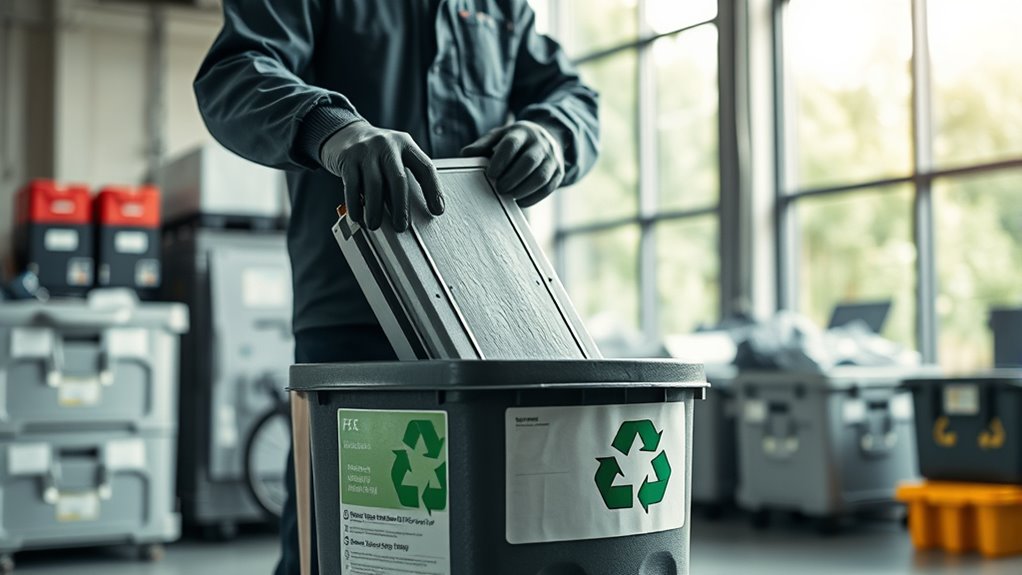To recycle or dispose of old e-bike batteries responsibly, locate certified recycling centers or drop-off points nearby that handle lithium-ion batteries. Never try to open or dismantle the batteries yourself—handle them carefully during transportation in non-conductive containers. Always follow manufacturer and local guidelines to guarantee safe disposal, and consider mail-in programs if local options aren’t available. Staying informed about proper recycling methods helps protect the environment and conserves resources—learn more to make the right choice.
Key Takeaways
- Locate authorized recycling centers or drop-off points that handle lithium-ion e-bike batteries.
- Never open or dismantle the battery; handle with care to prevent damage or leaks.
- Transport batteries in non-conductive containers, keeping them cool and dry to avoid hazards.
- Consider mail-in recycling programs if local facilities aren’t available.
- Follow manufacturer guidelines and regional regulations to ensure safe and compliant disposal.

Recycling Old E‑Bike Batteries
As e-bike batteries reach the end of their lifespan, recycling becomes essential to prevent environmental harm and recover valuable materials. Proper battery recycling guarantees that harmful chemicals don’t leach into the soil and water, protecting ecosystems and public health. When you decide to dispose of your old e-bike battery, you should prioritize eco-friendly disposal methods that minimize environmental impact. Simply throwing it in the trash isn’t an option, as lithium-ion batteries contain hazardous materials that require specialized handling.
Recycling e-bike batteries prevents environmental harm and recovers valuable materials safely.
The first step is to locate a certified recycling facility or drop-off point that accepts e-bike batteries. Many electronics stores, bike shops, or recycling centers partner with organizations that handle battery disposal responsibly. Check online or contact local waste management authorities to find the nearest authorized collection site. These facilities have the proper equipment to safely dismantle and recycle batteries, recovering valuable components like lithium, cobalt, nickel, and other metals that can be reused in manufacturing new products.
You should never attempt to open or dismantle the battery yourself. Lithium-ion batteries are complex and can pose fire hazards if mishandled improperly. Always handle your battery with care, avoiding punctures or damage. When transporting it to a recycling center, keep it in a cool, dry place, and place it in a non-conductive container or bag to prevent accidental short circuits.
Promoting eco-friendly disposal isn’t just about choosing the right facility; it also involves understanding the importance of responsible recycling. Recycling old e-bike batteries reduces the need for mining new raw materials, conserving natural resources, and lowering energy consumption. It also prevents toxic substances from contaminating the environment, which can have long-term detrimental effects on wildlife and communities. Additionally, employing proper recycling techniques ensures that the maximum amount of valuable materials is recovered while minimizing environmental risks.
In some regions, government regulations or environmental programs offer incentives for recycling batteries properly. Take advantage of these initiatives by staying informed and participating actively. Many organizations also offer mail-in recycling options, which can be convenient if local facilities aren’t available. Always follow the manufacturer’s guidelines for disposal, and dispose of your e-bike battery through authorized channels.
Frequently Asked Questions
Are There Specific Disposal Days for E-Bike Batteries?
You might wonder if there are specific disposal days for e-bike batteries. Check local programs for battery collection events or hazardous waste days, as many communities hold special days for recycling batteries safely. These events ensure your old e-bike batteries are handled properly and don’t harm the environment. Keep an eye on local government websites or waste management schedules to find out when these collection days occur in your area.
Can I Recycle E-Bike Batteries at Regular Household Recycling Centers?
Your question is crucial—imagine tossing a powerful e-bike battery into regular trash and unleashing chaos! You can’t recycle e-bike batteries at household recycling centers because they’re considered hazardous waste. Instead, look for specialized battery recycling programs or hazardous waste disposal sites. These programs safely handle the chemicals and materials, preventing environmental harm. Always choose proper disposal options to protect your community and the planet from dangerous pollutants.
What Are the Environmental Impacts of Improper E-Bike Battery Disposal?
If you dispose of e-bike batteries improperly, you risk exposing yourself and the environment to battery chemical hazards, which can cause serious health issues. Additionally, harmful chemicals may leach into the soil, leading to contamination that affects plants, animals, and groundwater. Proper disposal prevents these environmental impacts, safeguarding ecosystems and human health. Always recycle batteries through designated facilities to avoid these dangers and ensure safe, responsible waste management.
Are There Any Costs Associated With Recycling E-Bike Batteries?
When you consider recycling e-bike batteries, you should be aware of potential cost considerations. Recycling fees can vary depending on your location and the recycling facility you choose. Some programs may offer free or low-cost recycling, but others might charge fees to cover processing costs. It’s worth researching local options, as paying these fees helps make certain that proper disposal is achieved and reduces environmental harm, making the process both responsible and affordable.
How Do I Identify if My E-Bike Battery Is Recyclable?
It’s amusing how many batteries seem unrecognizable until you check their labeling, right? Your first step is to look for battery labeling and recycling symbols on your e-bike battery. If these symbols are present, they indicate the battery is recyclable. Don’t ignore these clues—they’re your best guide. If in doubt, consult your local recycling program or manufacturer to verify. Identifying these signs ensures you handle old batteries responsibly.
Conclusion
By recycling your e-bike batteries responsibly, you help protect the environment and conserve valuable resources. Don’t just toss them in the trash—find a proper disposal or recycling facility near you. Isn’t it worth taking a small step to reduce pollution and promote sustainability? Making the effort to handle your old batteries correctly guarantees a cleaner, greener future for everyone. So, next time your battery needs replacing, will you choose responsible disposal?









